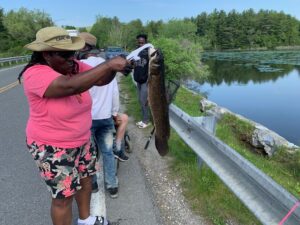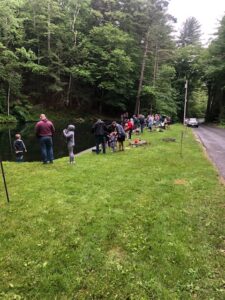Bills filed by State Representatives Lori Ehrlich and Ann-Margaret Ferrante and Sen. Michael Moore (H 904 / S 587), would enter Massachusetts into the Interstate Wildlife Violator Compact, a network that seeks to reduce wildlife poaching through information sharing across state lines and reciprocal recognition of license suspensions and revocations for fishing, hunting, and trapping. This legislation would update the Commonwealth’s outdated penalties for illegal hunting, some of which have not been updated in a century and currently amount to little more than a slap on the wrist,” Ehrlich said recently at an Environment, Natural Resources, and Agriculture virtual hearing. Simply put membership protects wildlife, supports law-abiding hunters and anglers, and provides the Massachusetts Environmental Police (MEP) additional resources to combat poachers and other wildlife criminals.
Stephanie Harris of the Animal Legal Defense Fund feels that Massachusetts is a poacher’s paradise and it is uniquely vulnerable to poachers. “(The Compact) simply adds another tool to our agencies’ tool belts. (It) ensures that MEP has access to the information that they need to determine where an out-of-state violation would or should result in license suspension here in the Commonwealth,” she said. “The legislation mainly updates penalties for illegal hunting to strike a balance between modernizing certain century-old penalties without becoming too punitive.” “For instance, the bill increases fines for hunting in a wildlife sanctuary from a range of $50 – $100 to a range of $100 – $500 and allows for the suspension of licenses for up to three years for a first offense and up to 10 years for a third offense.
“It similarly updates fines and license suspensions for other violations unchanged since the 1930s, when there was a major boom in state wildlife laws because certain species were hunted or trapped nearly to extinction,” Harris said. “And for context, a fine of $50 in the 1930s would, keeping up with inflation, be about $800 today. The (proposed) updates are more modest.”
Massachusetts and Hawaii are the only two states not in the Compact, though legislation is pending that would enter the Aloha State into the national compact. “Massachusetts has always led the way in terms of the protection of animals, but for some reason we’ve missed the opportunity to work collaboratively with other states and stop wildlife criminals.” said Christopher Borgatti, a member of the New England Chapter of Backcountry Hunters and Anglers. “The Commonwealth’s initial membership to the Compact is long overdue. Simply put membership protects wildlife, supports law-abiding hunters and anglers, and provides the MEP additional resources to combat poachers and other wildlife criminals.” he said.
Should Massachusetts pass the legislation, it would authorize the Commissioner of the Department of Fish and Game (currently is Ron Amidon) to join the compact. Then, MassWildlife and the Division of Marine Fisheries would have a year to promulgate regulations around implementing the Interstate Wildlife Violator Compact, according to the bill.
Good sized bowfin hauled out of Onota Lake
Crystal Taylor of Pittsfield was fishing for crappie with her fiancé Tara Taliaferro on the Dan Casey Causeway on Onota Lake recently. Using minnows as bait, she hooked into a large fish that put up a good fight. When she got it near the shore, Tara, who is also an experienced angler, netted it for her. It turned out to be a large bowfin. measuring about 26 inches and weighed approximately 5 lbs. According to Chuck Pero, who lives on the lake and who happened to be walking by, Crystal was obviously a seasoned angler for she “landed it like a true professional despite the fight it put up”.
Unfortunately, they didn’t have a measuring tape or scale, said Pero, but it looked over 26 inches and weighed about 5 lbs, probably worthy of a state pin.
After posing for pictures, Crystal released the fish. She was experienced enough to know not to put her fingers in or near its mouth to retrieve the hook. Instead, she clipped the fishing line right next the hook
Massachusetts Environmental Police Lt. Tara Carlow saw this picture and asked that I please identify it as a bowfin and not a snakehead which is a different species. Contrary to messages on Facebook claiming otherwise, it was a bowfin. They are not one and the same and don’t necessarily have to be killed, she said.
Public hearings on license and fee increases
MassWildlife has released a new license proposal, which incorporates public input on the original February proposal. In the new proposal, most fee increases will be phased in over five years beginning in 2022 and fee increases for hunting permits and stamps are lower than originally proposed.
The current proposal incorporates public feedback gathered through six information sessions held in February and March, phone calls, emails, letters, and a webform. Although many stakeholders expressed an understanding of the need to raise fees after 25 years, there was a strong desire to see fee increases phased in over time, and to lower the proposed increases to hunting permits and stamps. In response, MassWildlife and the Department of Fish and Game worked with the Baker-Polito Administration to revise the original fee proposal. Recognizing that all Massachusetts residents benefit from MassWildlife’s work to conserve wildlife, protect open space, and preserve clean water and air, the Baker-Polito Administration will work to diversify MassWildlife’s funding and reduce the burden on the fee-paying sporting community. This change will make it possible to maintain MassWildlife’s programming and services with lower fees than originally proposed.
Public hearings will be held on June 22, 23, and 24 on Zoom to provide the public an opportunity to comment on the new proposed changes. Check out the MassWildlife web page for instructions on how to join the hearings. You can also provide written comment up until 4:00 pm on July 8. The hope is that the entire process will be finalized in time to incorporate the changes into the 2022 Fish and Wildlife Regulations.
Enjoyable fishing derby at the Hatchery
The way the day started last Saturday you would have thought that no one would attend the monthly Youth Fishing Derby at the Berkshire National Fish Hatchery pool in Hartsville (a hamlet of New Marlborough). Fifteen minutes before the scheduled opening, cars carrying kids and their parents started arriving and by opening time, the rain had stopped. Out of the cars and to the pool ran the kids awaiting opening time and looking for some of the 300 or so trout which were previously stocked there. The parents signed them in at the official measuring station, manned by Friends of the Berkshire National Fish Hatchery President Dave Ziegler.
The rules of the free fishing derby stipulated that only youths aged 13 years or younger could participate and they had to be accompanied by an adult. Each fish had to be checked in and officially measured at the checking station. Kids could keep as many fish as they caught or release them back into the pond. Prizes for the winners were fishing poles and a tackle box. If someone caught a tagged trout, they received an official Friends of the Berkshire National Fish Hatchery T-shirt. The derby officially starts at 9:00 am and ends at 10:30 am.
At 9:00 am sharp, Dave yelled “Start fishing!” Out flew the bobbers and baited hooks. No sooner had they hit the water when the brook trout starting hitting. Each time a kid caught a trout, he or she ran to the measuring station to have it measured and checked in. Some kids carried them in their bare hands and others wrapped them in towels so that they wouldn’t slip away. Some released their fish back into the water and some kept them to bring home to eat.
The weather turned nice and some 19 or 20 kids entered and had a great time.
